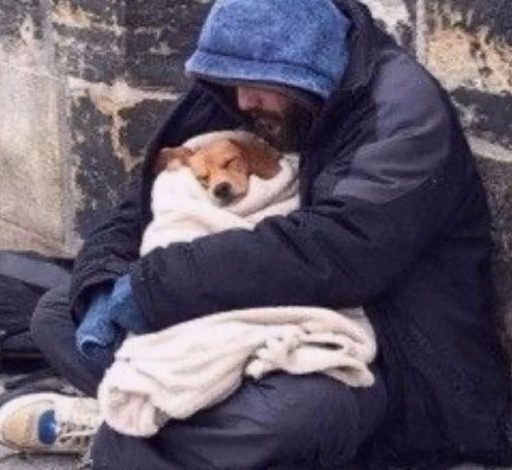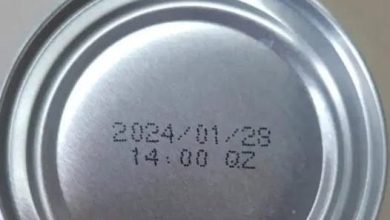HE USED THE ONLY WARM BLANKET HE HAD TO COVER HIS ONLY FRIEND, HIS DOG

This is a heartwarming story about the power of kindness and the bond between a man and his dog. It highlights how a single act of compassion can have a ripple effect, changing lives in profound ways.
Nights on the street are brutal, especially when the cold seeps into your bones. The narrator, Marcus, knows this all too well. His life changed six months ago when he found Benny, a small, scruffy dog, shivering and near death behind a dumpster. “I couldn’t leave him,” Marcus says, “Maybe because I know what it feels like to have nobody.”
Marcus only has one thin, fraying blanket. One particularly cold night, Benny shivers uncontrollably. Marcus makes a difficult choice. He wraps Benny in the blanket, offering his own body as a buffer against the cold brick wall. “Stay warm, buddy,” he whispers.
Suddenly, he feels something soft being draped over him. He awakens to see a woman, perhaps in her mid-forties, tucking another blanket around him. “It smells clean, like fabric softener, like home,” Marcus observes. She offers a small nod and departs. This simple act of kindness, this tangible gesture of warmth, leaves a deep impression on Marcus. “I didn’t catch her name that night,” he reflects, “but for some reason, her kindness lingers in my mind more than the cold.”
The new blanket is thicker and warmer. It offers not just physical warmth, but also a sense of hope. The next morning, Marcus and Benny set out, and Marcus heads toward the community center on Maple Street, hoping for a free breakfast. He sees the woman from the night before, arms laden with boxes, clearly volunteering.
He approaches her, a little shyly. “Ma’am?” he calls. She recognizes him and Benny. “Oh,” she says, “You’re the man from the alley. How’s your pup?”
Marcus thanks her for the blanket. He learns her name is Beth. He feels a sense of relief just knowing her name. “Thanks again,” he says, “You saved me—and Benny—a very cold night.”
Beth, noticing the line for breakfast, offers to bring Marcus something outside, since Benny isn’t allowed in. This small gesture of consideration touches Marcus deeply.
Over breakfast, Beth and Marcus talk. She asks about his situation. He explains he’s been living on the streets on and off for a couple of years, since losing his job and his apartment. He mentions the difficulty of finding shelter that allows pets. “He’s your family, right?” Beth asks. “Yeah,” Marcus replies, his throat tightening. “Only family I got.”
Beth tells Marcus about a new pilot program that might make exceptions for people with emotional support animals. She even writes down the address and gives him her cell phone number. “That’s the address,” she says, “plus my cell number. If you need help getting there, or if they give you a hard time, call me.”
Marcus is overwhelmed by her generosity. “Why are you—why are you doing this?” he asks.
Beth replies simply, “I’ve been helped before when I needed it. Just paying it forward.”
Marcus goes to the “Second Chances Initiative” office. He fills out an application, listing Benny as an emotional support dog. The receptionist is surprisingly understanding. They tell him there’s a short waitlist for transitional housing.
That night, the temperature plummets. The forecast predicts snow. Marcus and Benny find a sheltered spot, but the wind is biting. He realizes this won’t be enough if it snows. He remembers Beth’s number. He calls her, hesitant to impose.
Beth answers immediately. “Where are you?” she asks.
She picks him and Benny up and takes them to a local shelter that sometimes makes exceptions for dogs. “They have a bed for a few nights,” Beth explains, “as long as you keep Benny by your side.”
Over the next few days, Marcus works with the shelter staff and Beth to get enrolled in the Second Chances Initiative. He’s approved for transitional housing – a small unit, but a home.
Beth helps him get settled, bringing groceries. Marcus is overcome with gratitude. “I don’t know how to thank you,” he says.
Beth waves it off. “You already have,” she says. “Just seeing you and Benny in a safe place—that’s all the thanks I need. And maybe, when you’re in a better spot, you can do the same for someone else.”
The story concludes with Marcus reflecting on the power of Beth’s kindness. Her simple act of giving him a blanket started a chain of events that changed his life. “It sparked a chain of events that led me here,” he thinks, “a roof over my head, a fresh start, and a future that might finally hold something other than day-to-day survival.” The story emphasizes the importance of small acts of kindness and their potential to transform lives. It reminds us that everyone deserves to be seen and that even small gestures can offer hope and pave the way for a new beginning.




